
When the Big Orange Pantry opened its doors on campus last year, it came at a time when the future felt uncertain, and Volunteers were eager for opportunities to help.
In just a few months, nearly 100 Vols have made the fulfillment of more than 600 orders for food a reality. A survey of patrons found that 77 percent said they would have missed a meal without the pantry’s assistance, and those patrons were glad to receive complete nutritious meals that could serve their family as well.
The pantry, which was established through a generous gift by Donnie (’80) and Terry Smith, seeks to ensure that no student struggles with food insecurity during their time at the university, leaving them free to focus on learning, growing, and discovering a path for their future.
The path to fulfilling this mission includes contributions from students and faculty in departments across campus. Maikel Mikaiel (’21), a student in the Haslam College of Business’s Department of Supply Chain Management, has developed an inventory management system for the pantry. Ashlyn Anderson (’22), who studies food security and public health nutrition, and sociology major Mikayla Prince (’21) were instrumental in bringing together advocacy groups across campus to make the pantry a reality. Other areas of campus involved include the Office of Sustainability, the Jones Center for Leadership and Service, the Student Basic Needs Coalition, and the College of Social Work.
Coordination Central to Pantry’s Success
Much of the vision for the Big Orange Pantry was developed in this interdisciplinary manner, with diverse members of the Volunteer community bringing their expertise to the table.
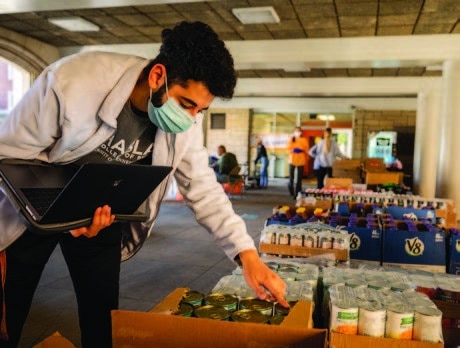
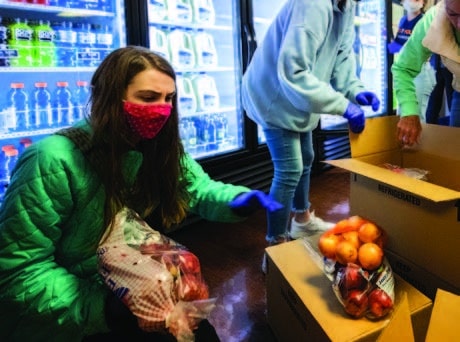
Shea Kidd Houze, associate vice chancellor for student life and dean of students, said the Big Orange Pantry is the culmination of years of work which has yielded a plethora of initiatives to address food insecurity on campus. Now all of those initiatives share a hub.
“As Maslow’s hierarchy reminds us, when basic needs like food, clothing, and shelter are not met, it is difficult to focus on anything else,” Kidd Houze said. “The creation of the pantry will hopefully alleviate concerns of students wondering where they will access their next meal.”
Kidd Houze added that the need for food support has grown in recent years. Smokey’s Pantry, which is located on campus and open to the general public, is operated by an outside organization and only open for limited hours. However, data collected by Smokey’s Pantry proved key to moving the antihunger initiative forward. The need for a full-time pantry was evident.
“We were fortunate to connect with Donnie Smith who had an interest in this initiative, and we are grateful for his and Terri’s generosity,” Kidd Houze said. “Their love for Tennessee has been evident in various aspects of our campus, and this is another tangible example of the Volunteer spirit at work. Our hope is that we are able to continue to grow the Big Orange Pantry Fund as an avenue to support and sustain the Big Orange Pantry and food-insecurity initiatives.”
The way our alumni and friends have stepped up to support UT students during a difficult year has been nothing short of amazing.
– Chancellor Donde Plowman
A Welcoming, Accessible Experience
Abigail Brumfeld, who serves as an assistant director in the Office of the Dean of Students, coordinated significant parts of the Big Orange Pantry in her role as a co-advisor for the Student Government Association. She was responsible for bringing together many campus constituents who shared their expertise and resources.
One feature of the pantry Brumfeld highlights is the possibility of a grab-and-go meal option. Under the plan, the Office of Sustainability and the Culinary Institute would reclaim food from dining halls and make grab-and-go meals available at the pantry.
“We want the pantry to be a place where people don’t feel stigma but feel like it’s a shopping experience instead,” Brumfeld said. “Much of this will be client choice, and I’m excited because we’ve got some really smart people working together.”
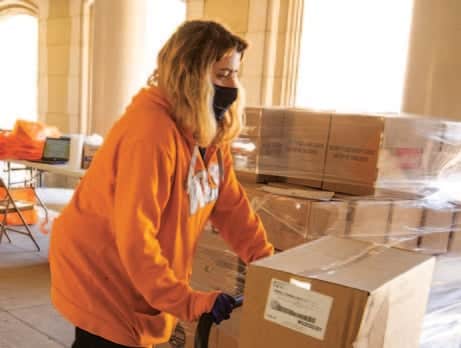
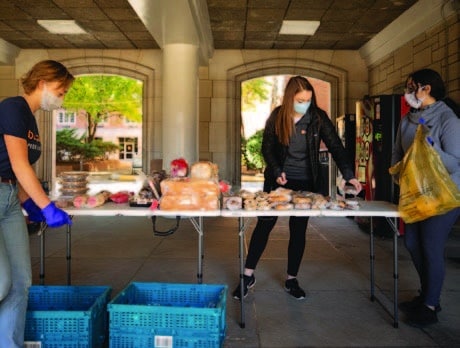
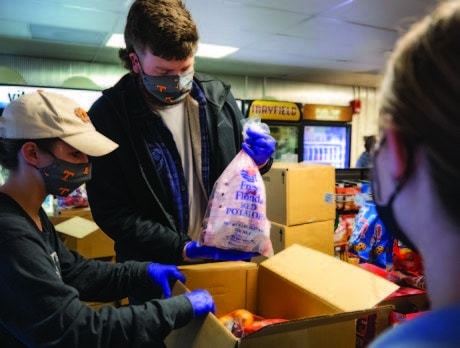
One of those people is Anderson, who is studying under the guidance of Betsy Anderson Steeves, assistant professor of public health nutrition at UT.
“My passion for addressing food insecurity among college students started when I saw data collected by Professor Steeves,” Anderson said. “The data shows the magnitude of this issue on campus, and I think the pantry has an enormous amount of potential for unifying the antihunger movement at UT. I envision it being completely destigmatized and normalized for use at any time. Getting food support shouldn’t be something students feel alienated about, and this will be available as they work hard to obtain higher education.”
Anderson Steeves echoes the sentiment of many others involved in the project when she says food insecurity defies stereotypes: it is impossible to know based on a person’s appearance whether they have enough to eat. That, in and of itself, is a reason for Volunteers to be active in their community.
“We’re in the same boat as a lot of other institutions, but what’s really exciting to see is the response of the campus community—from students, faculty, staff, and alumni—to rally around our students and help address this issue once we had these hard numbers,” Anderson Steeves said. “In this semester where I feel like there are so many things that are less than ideal, whenever I talk with different groups about the pantry it always lifts me up because everyone is constantly asking, ‘How can I help? How can I get involved?’ and that’s so inspiring.”
The Big Orange Pantry is currently open four days a week to students, faculty, and staff.
